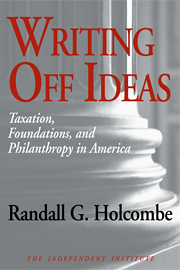The estate tax is under fire these days, largely because of its impact on family farms and small businesses. But its effects reach much further. One rarely considered area in which estate taxes have a major impact is on America’s non-profit sector. Admittedly, the effect of the estate tax on America’s non-profit sector is comparatively minor, but it offers yet another argument for repealing the tax.
One way to avoid the estate tax is to create a non-profit foundation. The foundation can engage in a wide range of activities, following the direction of its founder, and can continue those activities long after the person who created it has died. One problem with this type of charity is that after the founder’s death, the foundation will be run by trustees who may have motivations very different from the founder, and are accountable to no one.
Henry Ford, for example, was very uncharitable in his lifetime, and believed (probably correctly) that the best thing he could do with the profits from his Ford Motor Company was to reinvest them in the business to give hard-working Americans good jobs. After his death, most of his wealth went into the Ford Foundation, as a way for him to avoid the estate tax. In the decades after it was founded, the Ford Foundation was notorious for funding anti-capitalist groups and causes. Surely, Henry would have disapproved.
Businesses must satisfy their customers or they will fail. Politicians must meet the approval of voters to get re-elected. Even most charitable organizations must satisfy their donors or their donations will dry up. Foundations, however, are funded from the earnings on the endowments left by their founders, so have a perpetual source of income. Furthermore, foundation trustees can fund whatever causes they like without having to answer to anyone.
During his lifetime, John D. Rockefeller’s favorite charities were health-related, because he could see the immediate benefits of health programs. Andrew Carnegie built public libraries as a philanthropic activity, and donated organs to churches. The results of these activities were tangible and immediately visible.
After their deaths, the foundations that bear the names of Rockefeller and Carnegie drifted away from these activities and increasingly funded social and political programs. They dabbled in race relations and international affairs, and not only were the results of their activities less obvious and less tangible, some would argue that they were even counterproductive.
With today’s estate taxes, one of the big motivations for creating such foundations is tax avoidance. Thus, more money goes into foundations where it is allocated by people who had no hand in earning the money, who then use it to try to further their vision of a good society. Repealing the estate tax will eliminate this bias in favor of setting up foundations.
I certainly do not mean to question the motives of those who run foundations, but rather want to suggest that removing the tax incentive to create foundations would produce better charity, with more accountability.
One alternative to the creation of foundations is to have wealthy people give away more of their money during their own lifetimes. This gives them more oversight, so the donor’s intent is more likely to be realized. Money not given away during the donor’s lifetime could be left to the donor’s heirs. The heirs can then choose among various charitable activities and spending the money on themselves.
This is preferable to forcing them to give the money away, as foundations must do, because the heirs must be able to see the value in the activity to prefer charity to their own spending. Even if they squander some of the money on their own luxuries, the remaining charitable activity is likely to be more directed to the public good.
Some heirs will selfishly squander their wealth, to be sure, but the descendents of America’s great capitalists have tended to be more philanthropic than those capitalists themselves, who, after all, had to focus their activities on their businesses in order to acquire their fortunes.
Their heirs, who typically have grown up wealthy and privileged, have tended to be well-educated, thoughtful, and charitably-inclined. And if they are giving away their own inherited wealth, they bear the full cost of their actions, so they would be even more thoughtful in their philanthropy.
If people want to set up foundations with their wealth, and turn over the control of their fortunes to people who answer to nobody for their actions, that should be up to them. But we should not encourage them to do so through our tax laws. This is yet another reason to repeal the estate tax.













